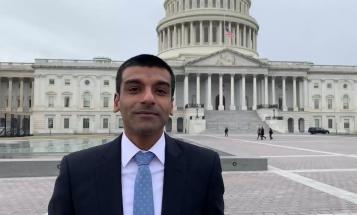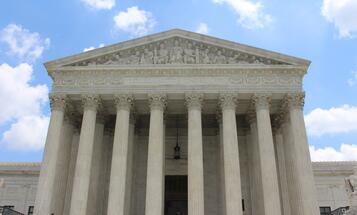
McCutcheon Oral Arguments Point to Way Backward, and Forward
Yesterday, in spite of official Washington being on lockdown, the Supreme Court heard oral argument on McCutcheon v. FEC—a case many are referring to as “Citizens United II.”
The case is a challenge to the total cap on the amount that one wealthy donor can give to all federal candidates, parties, and PACs, known as “aggregate contribution limits.”
An Alabama coal industry executive named Shaun McCutcheon (joined by the RNC) thinks that the current $123,200 cap—more than twice what an average family makes in a year—is a burdensome restriction on his political participation. So, he’s asking the Court to lift the cap, freeing him to kick in more than $3.5 million to Republican candidates and party committees.
Senator Mitch McConnell, who proudly embraces his reputation as the “Darth Vader of campaign finance reform,” has asked the justices to go further by overturning key parts of the Court’s seminal campaign finance case and striking all contribution limits, including the cap on the amount an individual can give directly to any one candidate (currently $5,200 per election cycle).
What’s at stake in the case? New research from Demos and U.S. PIRG projects that striking aggregate limits would bring more than $1 billion in additional “McCutcheon Money” through the 2020 election cycle, from just slightly more than 1500 elite donors.
This is not a sea change in overall election spending, and much of this money may be shifted from Super PACs to candidates and parties. But, it will continue to shift the balance of power from average citizens to a tiny minority of wealthy donors. And, who are these wealthy donors? In a nutshell, they don’t look like the rest of the country, but rather are avatars of what Public Campaign calls “Country Club Politics.”
Yesterday’s argument suggests that Chief Justice John Roberts (the likely swing vote in this case) may be looking for a middle ground—perhaps looking to strike aggregate limits on giving to candidates but maintain the cap on party giving. He queried, for example, “is there any way to prevent the concern you have about the three-point-whatever-it-is check without imposing the limit on the person who wants to support ten candidates rather than one?”
With echoes of Citizens United on his mind, Roberts may try to present this as a reasonable middle-ground approach, seeking to avoid blockbuster headlines and an attendant blow to the stature of the Court.
But, make no mistake: any move to strike a federal contribution limit for the first time ever would be a big step backwards for both politics and law. Enabling elite donors to “max out” to an unlimited number of candidates wouldn’t just encourage circumvention of remaining limits; it would also make a narrower set of wealthier donors into political kingmakers—acting as gatekeepers deciding who can run effective campaigns.
From a legal perspective, such a “moderate” ruling would in fact upset longstanding precedent and put other contribution limits squarely in the Court’s crosshairs.
Sen. McConnell’s lawyer went so far as to suggest at oral argument that because the Court decided in Citizens United that “gratitude and influence are not considered to be quid pro quo corruption” that the reality of an officeholder feeling thankful to a donor and actually being influenced by that donor “is not the sort of corruption that would sustain this limit.” In other words, it should be constitutionally required that officeholders feel a different level of affinity for large donors than to their average constituents.
The fact that a lawyer would suggest this to the justices with a straight face shows just how far the Supreme Court has drifted from reality and common sense on this issue. And, the fact that the Court took this case at all shows where their priorities are—agonizing over a specious burden on about a thousand millionaires and billionaires (who are already spending heavily on politics) rather than focusing on the rights of ordinary Americans.
But, in the midst of Tuesday’s obscure discussion there were also rays of hope.
As Jeff Clements recently noted on the ACS blog, the core problem with the Court’s campaign finance jurisprudence is that the conservative justices have sharply limited the arguments that reformers can make by calcifying in the law the dubious principle that fighting corruption or its appearance is the only permissible rationale for regulating campaign money.
The problem with this is that reasonable restrictions on wealthy donors’ ability to translate economic might into political power aren’t just about clean government. The role of money in politics is also about power and voice—can those who can afford the biggest megaphones drown out fellow citizens with just as strong of a desire to speak, but without the means to pump up the volume.
In other words, basic principles of political equality—and the concept of one person, one vote—are at stake here, whether the majority of justices choose to acknowledge this or not.
It appears that some of the justices are picking up on this theme. Justice Ginsburg, for example, picked up on the argument that “by having these limits you are promoting democratic participation, then the little people will count some, and you won’t have the super-affluent as the speakers that will control the elections.”
Justice Breyer pointed to a “First Amendment positive” of contribution limits, noting that “if the average person thinks that what he says exercising his First Amendment rights just can’t have an impact through public opinion on his representatives, he says: What is the point of the First Amendment?”
Granted, these are justices that already support sensible money-in-politics restrictions. None of the conservatives are ready to crack open this door. And, the Court does not need to make this shift in order to rule against McCutcheon—common sense and longstanding precedent are all it needs.
But, this recognition points the way forward in the long term. We need a new jurisprudence that acknowledges that political equality is a fundamental American value, ensconced in the Fourteenth Amendment, but also inherent in the First.
It will be a long road to make this the law of the land; but perhaps when we’re very far down that long road we’ll look back and remember the McCutcheon case as one of the places where the faint image of a clear map emerged.



